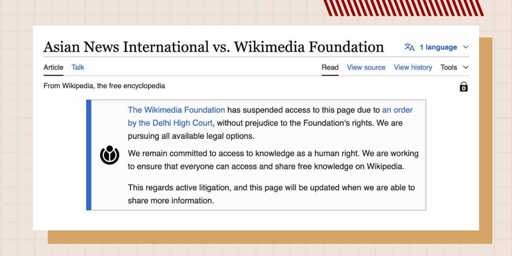- 7 Posts
- 13 Comments

 15·11 days ago
15·11 days agoRemoved by mod

 19·11 days ago
19·11 days agoI’d take their answers over yours because they’re a well-known lawyers group who is super-into privacy rights activism and they even are saying that they are compiling instances of so-called “troll pages” on German Wikipedia so that they can file a complaint to the relevant DPAs one day.
In this context I think you need to be mindful of the argument from ignorance fallacy; just because something has not happened or has not been proven either way, doesn’t mean that it’s not going to happen in the future.

 35·11 days ago
35·11 days agoRemoved by mod

 225·12 days ago
225·12 days agoExcept for those publicly visible sock-shaming and investigations pages, mark my words they’re going to be their Achilles heels one day. I’ve already asked some GDPR lawyers about it a long time ago and they agreed with me on that.

 120·11 days ago
120·11 days agoRemoved by mod

 19·12 days ago
19·12 days agoWhat I’m not seeing is any suggestion of a solution. Wikipedia has a slew of rigorous mechanisms to allow for community moderation, resolution/stoppage of edit wars, and well documented escalation paths. It has flaws, and it is a work of volunteers with inherent biases, hence the systems to address them. Instead of curating a list of deficiencies, it may be more effective to start building a list of potential solutions to the deficiencies at hand. If you were to take the existing model of Wikipedia, it’s rules, it’s moderation… What would you change to improve it? And more importantly, how?
Good question. One good approach would be to create as many Wikipedia alternatives as you can, which is actually doable through newly released ibis.wiki. There’s also Encycla, Justapedia and Namu.wiki to pick from, although because of Google is putting it high up in their search results, almost all earlier alternatives failed to get off the ground and gather enough momentum.
Cory Doctorow’s theory of enshittification can be applied to this one. According to him there are four constraints that prevent enshittification: competition, regulation, self-help and labor. Normally the first and the third one would be sufficient but as I see that Wikipedia has entered a terminal phase with those sexual scandals and so on, which would cause the Internet to turn against Wikipedia overnight, all the constraints would therefore have to be activated in this case. A likely result would entail Wikipedia liquidating and getting absorbed into more better, successor encyclopedic organizations, like how the League of Nations folded into the United Nations at the end of WWII.

 19·12 days ago
19·12 days agoPlease feel free to read this Reddit page which collects or summarizes a list of scandals and issues on Wikipedia.

 147·12 days ago
147·12 days agoThe systemic toxicity issues in Wikipedia, many of which aren’t even remotely related to Israel-Palestinian conflict, are increasingly looking like their Achilles heels.

 645·12 days ago
645·12 days agoThey would have to delete their “sockpuppet investigations” pages and so on first before they can move there, otherwise they would violate GDPR.

 02·4 months ago
02·4 months agoUpdate: They’ve already “sold out” the editors.
https://genderdesk.wordpress.com/2024/12/21/does-wikipedia-protect-your-privacy/
Anyone can take a look at what the Wikipedia editors themselves are saying about the matter.
-
https://en.wikipedia.org/wiki/Wikipedia_talk:2024_open_letter_to_the_Wikimedia_Foundation
-
https://en.wikipedia.org/wiki/Wikipedia:ANI_vs._WMF_Delhi_court
The admins from India have only been accused of defamation. Now that the court has their identities, the actual statements will be examined to see if they do actually contain defamation. So anyone can go on a fishing expedition to get someone’s identity, and then say ‘oops, no laws were broken after all’, and now that we know who you are, it would be a shame if someone fell out of a window or something. And of course whatever is in the “sealed” document is now out, India is one of the biggest places for bribery there is. They are also saying the documents will be unsealed at the end of the court case, so it might be cheaper to just wait until they are published.
-

 01·4 months ago
01·4 months agoWikipedia unfortunately has a policy of blocking so-called open proxies.

 01·5 months ago
01·5 months agoThat edit was intended for people who downvoted the comment for unknown reasons.

 01·5 months ago
01·5 months agoAnd that’s only the tip of the iceberg.

 01·5 months ago
01·5 months agoIt’s likely that the editors and principles have been betrayed by this point and thus Encycla and ibis.wiki should be the places we can flock to.
Edit: What’s going on with the downvotes? What is despicable or freakish about discussing Wikipedia through a critical lens?
X, for example, is discussed through a critical lens ad nauseum in many mainstream publications throughout the English-speaking world. Do you find that despicable, too?
Wikipedia has very big problems that profoundly effect public discourse. Yet almost nobody knows about them.
Out of curiosity, why is criticism of Wikipedia so infuriating to you? You can just take a look at what Tracing Woodgrains had written about Wikipedia or rather, the following by Aaron Swartz who’ve seen the problems far away.
http://www.aaronsw.com/weblog/wikiroads
I’ll be blunt here for die-hard defenders of Wikipedia; are you going to die on a wrong hill where the Andrew Tate fanboys are currently on just because of a website and institution which is far from perfect just like X, Meta, and United Nations?

 01·10 months ago
01·10 months agoWow, that’s miraculous!







Cory Doctorow has a word for the phenomenon: enshittification.